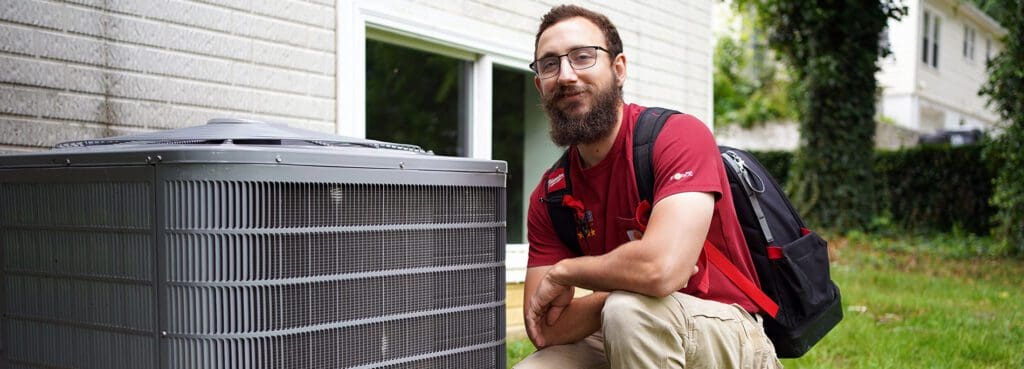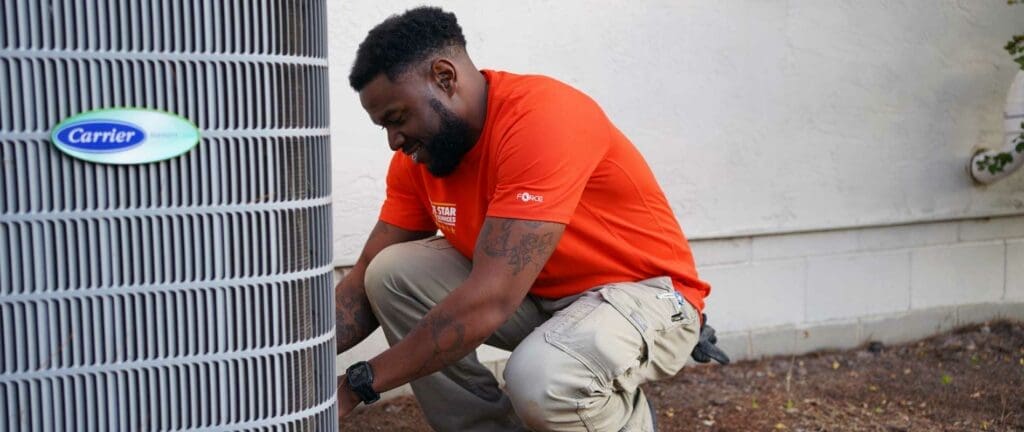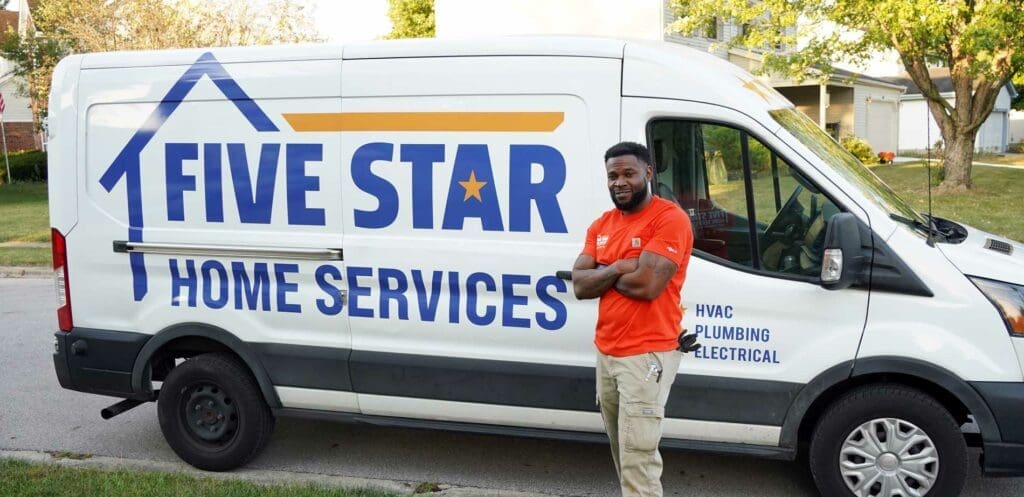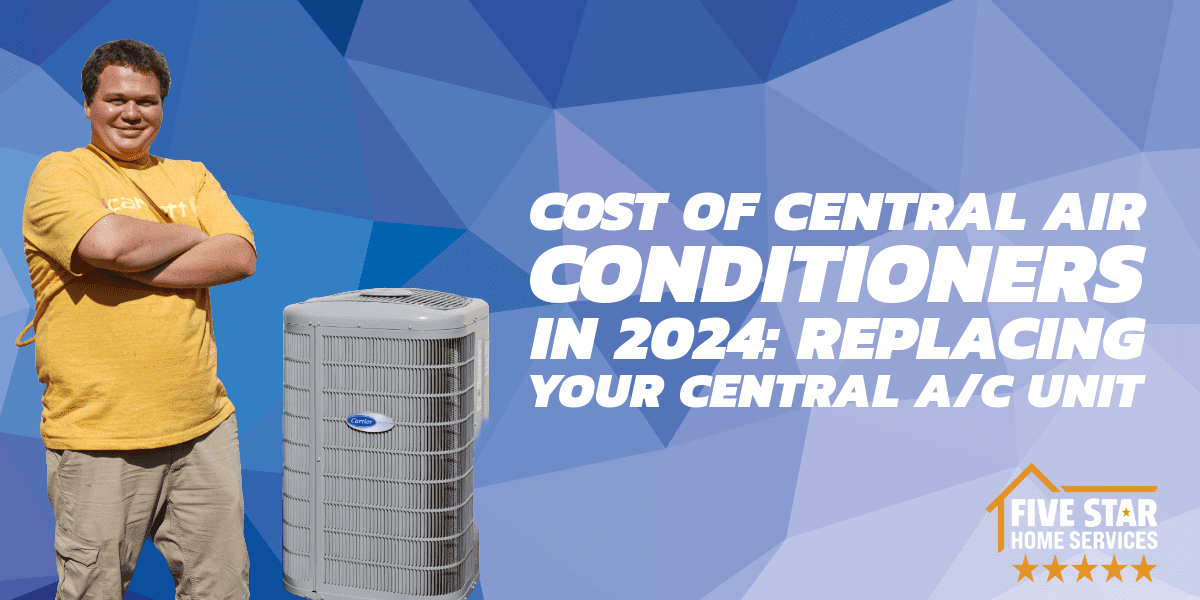If you’re considering replacing your central air conditioner, you might wonder how much the replacement system will cost you this coming summer. In the following article, your friends at Five Star Home Services will break down the factors that affect the cost of a new central air conditioner to help you make the best decision for your home when summer rolls around next year!
How Much Does Air Conditioning Replacement Cost?
The cost of replacing central air conditioners varies from $4,350 to $12,095. This includes the cost of labor, materials, permits, and other fees for all styles of air conditioners.
Other factors that can affect the price of your air conditioner replacement include:
- Efficiency
- Installation costs
- Line set protection
- Tax credits and rebates
- Capacity/power of the system
- Modifications to your existing system
- The HVAC equipment you’re not replacing
The following article will go into more detail, including more precise ranges for entry-level, mid-range, and high-end air conditioners. The decision to replace your central air conditioning system can be on par with the decision to renovate your home or buy a new car. Nevertheless, far too many homeowners go into this process blind with no idea what the overall cost will be or how these costs can be broken down to gain a better understanding.
No worries, though! That’s what your friends at Five Star Home Services are for!

This information is essential whenever a homeowner needs to make a major decision and invest a significant amount of money.
As a trusted local HVAC professional with more than 50 years in the home comfort industry, Five Star Home Services has helped countless homeowners understand all the cost factors affecting the final price tag of A/C system replacement.
When choosing a central air conditioner for your home, it is essential to remember all the other costs associated with your new purchase — including A/C installation, A/C repair, and other A/C services like annual tune-ups and check-outs.
We will now explore the various factors affecting central air conditioning replacement costs. By the end of this article, you will be better prepared to make the best decision for you, your home, and your comfort.
Common Air Conditioning Accessories & Costs
When most homeowners think of new cooling systems, they think of the A/C unit itself. Nevertheless, replacing your current system involves more than merely replacing the central air conditioner. Because of this, we will discuss some other components that affect the final replacement A/C unit costs.
The following list of items are usually required to install a central air conditioner:
- Local permits
- Condensate drainage
- Ductwork modification, if necessary
- Electrical costs involving breakers and thermostats
- Physical parts, including; indoor evaporator coil, outdoor pad, outside electric disconnect, an electric conduit from the disconnect to the air conditioner, new copper line set from the indoor coil to the air conditioner, and 15 feet of PVC pipe for use as a drain line
Air Conditioner Capacity
The capacity of your air conditioner affects its ability to meet your cooling needs. Capacity and size are interrelated. Because of this, the size of your system describes the output it needs to produce and recycle cool air into your residence adequately.
To properly size your home, your HVAC contractor needs to perform a load calculation. Load calculations measure the square footage of your home in addition to features affecting heat loss and heat gain, which enables them to recommend the best air conditioning unit for you. Other factors include the number and size of doors and windows and the height of your ceilings.
With that being said, one important thing to remember is that larger and more powerful air conditioners aren’t always better for your home. If you size your unit too big, the air conditioner will cycle on and off too much. As a result, it may not cool or remove moisture properly. Sizing is everything when it comes to home comfort equipment.
On the flip side, if your central air conditioner is too small, it will probably overwork itself and fail to adequately cool your home or remove moisture properly. This results in premature equipment failure and frequent need for repairs.
Because of these factors, there’s never a “one size fits all” central air conditioning solution for every single home — even homes that are the same in size. Every situation is different.
Additionally, the cost of equipment increases as you increase overall capacity. Nevertheless, an accurately sized HVAC system can help reduce your overall monthly energy costs and provide more comfort in your home, provided you avoid unnecessary on-off switching, which increases the longevity of your air conditioning system.

Air Conditioning System Efficiency
One important consideration homeowners should make when purchasing a central air conditioning system is its efficiency rating, or SEER rating (Seasonal Energy Efficiency Ratio). You’ll see this term used a lot, as it is the standard term for central air conditioners.
The SEER rating of a central A/C is similar to a vehicle’s fuel economy. Just like you may want to know how many miles per gallon a car can get, we can use a SEER rating to describe how efficient an air conditioner is.
The efficiency of a central air conditioning system can also provide increased comfort and, at times, a quieter system. This overall efficiency is part of the total cost of any central air conditioning system.
Newer AC systems can have SEER ratings of 13 to 20 or higher. Typically, as the SEER rating increases, the initial purchase cost also increases. Regardless, Energy Star reports that every new central AC unit must have a SEER rating of at least 14.
Operating your system will cost less when your air conditioner runs at a higher SEER level. Which can reduce the long-term air conditioning cost of your HVAC system
Matching Your HVAC Equipment
When most homeowners consider an air conditioner repair or ac replacement cost, they usually don’t give a great deal of thought (if any thought) about their existing furnace. Nevertheless, if you’re only replacing your central air conditioner, you also need to match your new central ac unit to your current heating and air conditioning system.
This is usually the case if you go with a variable-speed air conditioner that isn’t compatible with your furnace.
Variable-speed air conditioners require indoor blower motors which operate at different speeds. Because your HVAC system’s blower motor is located inside your furnace or air handler, we need to make sure both systems are compatible.
In any case, as a result, variable-speed systems usually offer the most control over your central air conditioner. Other types of air conditioners include the following:
- Single-stage air conditioners, which only have one setting at 100 percent capacity.
- Two-stage air conditioners, which have two settings: One is at 100 percent capacity and the other, a lower setting around 70 percent capacity. Two-stage air conditioners typically use less energy, which make them more efficient than single-stage.
Single-stage and two-stage air conditioners without variable-speed features can generally pair with single-stage and two-stage furnaces.
Your existing HVAC system limits your options at times. Nevertheless, if you’d like to install a variable-speed air conditioner, you may need to replace your home heating system or air handler as well. It depends on your circumstances.
Replacing a furnace or air handler typically costs anywhere from $3,999 to $7,025.
However, if you simultaneously replace your central air conditioner and furnace, you can increase efficiency and reduce costs. Ultimately, it is up to you to decide when to replace any of your systems.
Ductwork Modification Costs
While we are talking about matching equipment, we should point out something else: Your new HVAC system can also require ductwork modifications, especially if your existing ductwork isn’t the right size.
Air ducts are what help to circulate conditioned air throughout the home. In order to properly cool a home, ductwork needs to meet your system’s airflow requirements. Your HVAC system might require ductwork modifications because different air conditioners have different requirements. Nevertheless, sometimes the existing ductwork in a home was improperly sized for a previous installation and we have to address it.
Otherwise, failure to correctly modify your ductwork is likely to affect the performance of your system. Poorly sized ductwork can lead to hot or cold spots inside the home, even with a new system. Over time in the long run, this can also increase your energy costs and shorten your ac unit’s lifespan.
As your HVAC partner, we at Five Star Home Services can perform a thorough duct analysis to determine if your existing ductwork was properly sized for your HVAC system. If your current central air unit was improperly sized — our heating and air conditioning experts can discuss switching to a ductless air conditioning system. The end result should always be an HVAC system with freely flowing, properly sized air ducts that operate efficiently and effectively. The importance of optimal airflow cannot be overstated when it comes to any sort of home comfort equipment! Schedule an Estimate
Line Set Protection
Line sets are copper tubings connecting your outside ac unit to your indoor HVAC system. This tubing helps move refrigerant between the two with optimal flow. Because your HVAC system cools your home by moving ac refrigerant, your overall comfort depends on the integrity of your line set. Without proper protection, your line set can get exposed to outside elements, extreme weather and other damage.
Up until recently, there were only a handful of ways to protect line sets. Many of them were both ineffective and unsightly. Nevertheless, line set positive seal systems offer more effective, more aesthetically pleasing, alternatives to protect line sets.
Because this is a new product, it isn’t an industry standard. Nevertheless, we believe it should be. We protect each new air conditioner installation with a line set positive seal system.
Electrical Costs
The home comfort industry is among the very few trades in today’s modern world that requires expertise in multiple disciplines. This includes plumbing, carpentry, and electrical work. Variables associated with these areas can affect the final overall heating and cooling costs of an HVAC system or service. These variables include electrical modifications.
A lot of homes don’t require electrical modifications. However, those that do often need them in a couple of common areas, including:
- Updating the control wiring for a new thermostat
- High-voltage wiring and breakers at the electric panel
A lot of older HVAC systems have older thermostats that fail to provide the level of air control you’d like. In these instances, electrical modifications are necessary to ensure that your new HVAC system runs smoothly.
Depending on the complexity, electrical modifications can add between $100-$600 to the overall cost of an installation.
Although high-voltage work requires a state-licensed electrician to perform the work, we have electricians on staff. Without this licensure and the knowledge required to obtain it, you risk the quality, efficiency, and installation cost of your central A/C.
Condensate Drainage
When air conditioners run, they remove moisture from the air. This moisture is then condensed into water, which needs to be drained. This condensate runs to a floor drain, sump pump, or standpipe. Over time, obstructions can develop and stop this process. In these situations, condensate pumps would be required to pump the condensation to the proper drain for removal.
On average, condensate pumps usually cost around $379. We can discuss with you whether or not you’ll need one in order to adjust your budget properly.
A/C Installation Cost & Other Considerations
If you’re choosing a company to replace your existing heating and/or air conditioning unit, you should keep in mind that the installation process is the single most important step to ensure the overall safety and life expectancy of your HVAC system. Reputable HVAC contractors like Five Star Home Services follow several key processes to ensure your HVAC system’s comfort, efficiency, safety, and life expectancy. Otherwise, failure to do so can only lead to high energy bills, discomfort, and shortened equipment life expectancy. Also, keep in mind that it is important for many HVAC contractors to include labor or other fees in their estimates. As a result, you always end up paying more than you planned to. We always suggest checking that your HVAC contractor’s estimate includes these other costs. When you choose Five Star Home Services, we assure you that all of this is clear.
Rebates & Tax Credits For New Air Conditioners
Tax credits and utility rebates are often available on a variety of furnaces, central air conditioners, air handlers, and heat pumps, some of which include full HVAC system installations. Equipment manufacturers will occasionally have product rebates available. These rebates are usually for full system installations. Usually, they require a thermostat to be installed with your new HVAC system. At Five Star Home Services, we include the thermostat with the system. These digital, programmable thermostats and smart thermostats save you money on energy costs by giving you far more precise control over your system. Last but not least, Energy Tax Credits are also available on certain energy-efficient heating and air conditioning products. These ratings increase with the purchase of full HVAC systems at the same time. Be sure to ask about these along with the efficiency rating of your intended system.
Total Cost of an AC Replacement
The average cost for replacement of a central air conditioner in residential homes can vary from anywhere between $4,350-$12,095. This includes labor and permit fees.
Although that is a wide range, it merely reflects the equally wide range of variables and options available. Nevertheless, we at Five Star Home Services can break this range down a little further.
Air conditioning units typically fall into the following categories:
- Entry-level
- Mid-range
- High-end
Entry-level air conditioning systems offer single-stage cooling. They’re a reliable cool air solution if you’re on a budget or if you don’t plan to stay in your home long-term.
On average, entry-level air conditioners cost between $4,350-$8,000.
Mid-range air conditioners offer two-stage cooling. With their increased efficiency, they are great if you plan on staying in your home long-term.
On average, mid-range air conditioners cost between $6,200-$9,500.
High-end air conditioners offer homeowners variable-speed air conditioning. Because they provide you with the most control over your system, high-end air conditioners can be great if you want to address multiple problem areas. Overall, this can be a great investment for homeowners if they don’t plan to move anytime soon.
On average, high-end air conditioners cost between $8,200-$12,095. Schedule an Estimate
Why Costs Change
Pricing guides from even a year or two ago can be very outdated. Reasons this happen can vary, but in general they include the following:
- Inflation
- Cost of materials
- Innovations in the industry that provide new options or greater efficiency
- Regulatory and manufacturer standards necessitating updates
These factors can both increase and decrease costs. As you do your research, make sure you get the most updated information. Ask about each of these areas when a sales professional visits your home to provide estimates.
Financing Your Investment
If you’re interested in financing your new central air conditioner, many options are available for you with approved credit. Partial payment of cash/check and balance with financing can also be an option.
We at Five Star Home Services also have financing options available to meet your budget and lifestyle. We’re happy to work with you to find a plan that accommodates you while providing you with the best possible air conditioning systems.

Knowing What’s Right For You
The only way to determine your air conditioning replacement cost is to schedule an in-home estimate with an experienced professional. Nevertheless, when you know the factors affecting the cost of an ac replacement or new system installation, you can ask more informed questions to make more informed decisions when the time comes.
Having said that, if you’re ready to discuss options specific to your home, we are always more than happy to come over and sit down with you!
At Five Star Home Services, your satisfaction is our highest priority. This means you should always have the knowledge you need to make an informed decision. We have the team to help you determine the right HVAC system and products for you, your home, and your comfort.
Call us today at (833) 405-8009!

